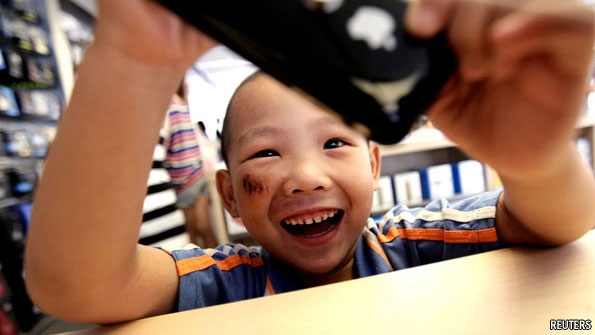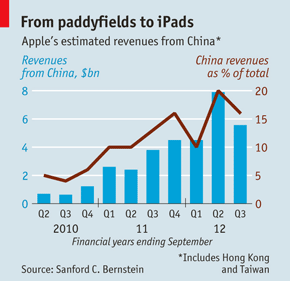[Economist] iPhones make Chinese eyes light up iPhone使中国人欢呼雀跃
来源:互联网 发布:米德尔顿 知乎 编辑:程序博客网 时间:2024/04/20 23:16
苹果在中国
iPhones make Chinese eyes light upiPhone手机使中国人欢呼雀跃
Apple doesn’t just make stuff in China; its sales there are booming, too苹果在中国不只是装配产品;它在中国的销量也在突飞猛进
Jul 28th 2012 | HONG KONG | from the print edition

当向西方人提到“苹果”和“中国”时,许多人会联想到血汗工厂。作为苹果在中国大陆最大的代工厂,富士康因超负荷工作和拖欠员工工资而备受社会公众指责。苹果承诺坚持要求代工厂改善工作环境。
Ask about Apple inside China, however, and you hear little but praise. It is one of the most admired brands in the Middle Kingdom. A survey last year by researchers at Stanford University found that iPad penetration was greater at an elite high school in Beijing than at one in Palo Alto, California. In the first quarter of this year Apple earned $7.9 billion in greater China, making it the firm’s second-biggest market (see chart). The latest iPad was launched on the mainland on July 20th.但是,在中国提及苹果,你只会听到赞美。苹果在中国是最受大众推崇的品牌之一。斯坦福大学的研究人员在去年做的一项调查显示相比一所加利福尼亚州帕洛阿尔托城的一所重点中学的iPad拥有率,北京的一所同级别中学拥有比例高很多。苹果今年第一季度在中国的收入达到了79亿美元,使中国一跃成为它第二大市场(见图表)。最新iPad已在7月20日在中国大陆发售。

按照常规,苹果在7月24日发布的最新结果表现极好:最近一季度的全球收益达到了350亿美元,将近有43%的净收入。令人惊讶的是,这个数值低于投资者预期数值,苹果股票价格因此跌了4.3%。分析师同时指责欧洲需求疲软和由新款iPhone手机发布谣言导致的购买延迟。
Sales in greater China fell to $5.7 billion, a plunge of 28% from the spectacular first quarter (when Apple launched the much-awaited iPhone 4S in the country). That was expected, however. More telling is that revenues rose by 48% year-on-year.中国的销售额跌至57亿美元,相比第一季度惊人收入缩水28%(当时苹果在中国发售了期待已久的iPhone 4S)。但是人们预期到了这个结果。而更值得注意的是与去年同期相比收入却增长了48%。
Sales of smartphones (of all brands) in China are soaring: they rose by 288% in April, year-on-year, and for the first time outpaced the sales of dumbphones. Sanford C. Bernstein, an investment bank, estimates that 270m people in China can already afford Apple’s products, and that each year another 57m will be able to. Many Chinese are desperate for its gadgets. This year a boy from Anhui, one of China’s poorest provinces, reportedly sold one of his kidneys to buy an iPhone and iPad.智能手机(所有品牌)在中国的销量势如破竹:与去年同期相比在4月份增长了288%,并且第一次超越了非智能手机的销量。根据一家投资银行Sanford C. Bernstein估计有2.7亿中国人有能力购买苹果产品,并且这个人数将每年增长5700万人。许多中国人痴迷于苹果产品。据报道,在中国最贫穷的省份之一的安徽省,今年有一个男孩儿为了买iPhone和iPad而卖掉自己一颗肾。
Apple’s sales could also get a boost from another quarter. China Mobile, which counts two-thirds of China’s 1 billion mobile subscribers as customers, does not yet officially offer Apple products. “To go big in China, Apple must get a deal with China Mobile,” says C.K. Lu of Gartner, a market-research firm. Rumours suggest such a deal may be in the offing.在下一季度,苹果的销量可能还会有提高。坐拥中国10亿手机用户的三分之二的中国移动公司还未正式支持苹果产品。一家咨询公司高德纳的陆C.K(音)说“为了在中国大展宏图,苹果必须与中国移动公司达成合作。”有传闻称这份协议正在协商。
In short, Apple’s products are selling fast and likely to sell even faster. Some predict that China will overtake America to become Apple’s largest market within a few years.总之,苹果产品销售地非常快,可能还会更快。一些人预计中国未来几年内将超越美国成为苹果全球最大的市场。
Hang on a minute, though. The Chinese market is strewn with landmines, such as an unpredictable intellectual-property system. Apple’s recent tablet launch was held up for ages because of a lawsuit filed by Proview, a bankrupt Chinese firm that claimed to own the mainland rights to the iPad name.但是,稍安勿躁。中国市场到处有类似不可预测的知识产权系统的陷阱。由于破产的中国的公司唯冠要求拥有iPad商标在中国内地的所有权而申请的诉讼案,使得苹果将其最新平板电脑在内地的发售时间推迟了很久。
Of trolls and leopards四面楚歌
Partly because it bungled its handling of the case, Apple was forced to pay $60m to settle. This has emboldened other patent trolls, which claim to own the Chinese rights to the name Snow Leopard (an operating system for Apple’s computers) and part of the technology behind Siri (a voice-recognition system on its phones).苹果被迫向唯冠支付6000万美元寻求和解,部分原因是因为自己的在该案件中的操作失误。这使得其他专利流氓更加猖狂,他们要求拥有Snow Leopard(苹果电脑的操作系统)和Siri(苹果手机上的语音识别系统)的部分技术在中国的所有权。
Meanwhile, Chinese pirates are poking Apple with cutlasses. Cheap shanzhai (knockoff) handsets with fruity branding are rife. So are “GooApple” devices that look like iPhones but run on Google’s Android operating system. Nearly two dozen fake Apple stores were found in Kunming, the capital of Yunnan province, last year. Some fakes fool no one (see picture). Still, Apple could do more to prevent piracy. For example, it has failed to expand its retail network fast enough, leaving the field open for fakers. It vowed to have 25 shops in mainland China by this time, yet there are only six.同时,中国盗版商也给苹果带来了麻烦。以水果命名品牌的廉价的山寨(名牌仿制品)手机随处可见。比如“谷果”手机,外观与iPhone非常相似,运行的却是谷歌安卓操作系统。去年,大概有20多家假冒的苹果专卖店在云南省会昆明市出现。但是有些假冒店铺未能欺骗大众。尽管如此,为了防止盗版,苹果还需做很多努力。例如,它未能迅速扩张其零售网络,使得盗版商们有机可乘。苹果曾宣称到这个时间点,在中国大陆将会有25家专卖店,而现在只有6家。

But can a real iPhone boil soup?
难道iPhone手机也能煲汤吗?
Another problem for Apple is that smartphone sales in China are driven mostly by cheap handsets. Sanford C. Bernstein estimates that two-thirds of smartphones sold last year in the country cost less than $300; the latest iPhone costs $800. Baidu, Alibaba and other local internet firms have introduced cheap cloud-connected handsets. Price competition at the bottom end of the market is so fierce that ZTE, a local handset maker, is thought to be losing money.苹果面临的另一个问题是智能手机在中国的销量受到低价手机的影响。根据Sanford C. Bernstein估计去年在中国三分之二的智能手机售价不到300美元;最新iPhone要800美元。百度、阿里巴巴和其他本土互联网公司已经发布了低价的支持云连接的手机。在市场底端的价格竞争异常激烈,有消息称本土手机厂家ZTE正在赔钱。
Apple could try to compete by offering a cheaper model with fewer features, something it has resisted in other markets. But that risks tarnishing its brand. Duncan Clark of BDA China, a consultancy, points out that Microsoft dumbed down its computers for the Chinese market in the 1990s—and flopped as a result.苹果可以尝试提供功能少但价格低的产品来与对手竞争,苹果在其他市场上对这种策略不屑一顾。但是,该策略带有毁掉苹果品牌形象的风险。咨询公司博达克中国的邓肯?克拉克指出在20世纪90年代微软曾在中国市场简化了自身电脑功能,结果碰了一鼻子灰。
A yuaning gap不只是人民币差异
The secret of Apple’s wild profitability in other countries is not just its elegant devices but the apps, music and films that customers download onto them. Its phones and tablets lure consumers into its lucrative iTunes ecosystem. At first glance, China is a promising market: last year app downloads shot up by 300%, rising to 18% of the global total. And Chinese sales at iTunes have gone up since it started accepting payments in yuan.苹果在其他国家赚取暴利的秘密不仅仅在于其卓越的设备,还在于消费者需要将应用、音乐和电影下载到这些设备上。苹果的手机和平板电脑诱使消费者加入其赚钱的iTunes生态系统。乍一看,中国是个有巨大发展潜力的市场:去年应用下载量暴涨300%,占全球下载量的18%。并且,自从iTunes接受人民币付款后,其交易量也有显著增长。
However, Chinese consumers are not parting with many of those yuan. They expect apps to be free, or at least to be offered on the “freemium” model. App Annie, a technology consultancy, estimates that payments made per Apple game app average $1.90 in Japan and $0.67 in America, but just $0.07 in China. This makes it hard for Apple’s business model to work there.但是,中国消费者舍不得掏钱。他们希望免费下载应用,或者至少提供“免费增值”模式。根据技术顾问公司App Annie的估计,下载一个应用程序的平均花费在日本是1.90美元,在美国是0.67美元,而在中国只有0.07美元。这使得苹果的商业模式在中国很难适应。
Some say Apple should copy an idea from Henry Ford. The great American carmaker paid his employees enough to afford a Model T. Will the workers who assemble iPads one day be able to own one? With wages soaring in China, that may not be a pipe dream. Given that wages account for only 2% of the retail price, bumping them up would hardly cripple Apple’s margins. And removing the “sweatshop” stigma might help its global reputation.有些人认为苹果应该效仿亨利?福特的作法。世界一流的美国汽车制造商支付员工足以购买T型车的薪水。生产iPad的工人一天的工资能购买一台iPad吗?随着中国工资水平上涨,也许很快就能实现。鉴于工人工资只占零售价的2%,提高工人工资不会影响苹果的收益。同时摆脱“血汗工厂”恶名也有助于提高全球声誉。
Apple has arguably helped to modernise Chinese attitudes towards enterprise and design. Chinese shoppers are eager not only to own its products but also to learn about the man behind the company; sales of a biography of Steve Jobs have been huge. Apple may even have helped nudge the Chinese government towards stricter protection of intellectual property—though pirated copies of the Jobs biography were available within days of the original, and at a fraction of the price.毫无疑问,苹果使中国人用现代化的眼光认识企业和设计。中国消费者不仅渴望拥有苹果产品,也希望能够了解这家公司的领导人;乔布斯传销量大得惊人。尽管乔布斯传正版发售后的数天内便出现了廉价的盗版书,但是不可否认,苹果公司对中国政府加强知识产权保护起到了一定作用。
完工备注:
完工时间:2012.07.28
原文链接:http://www.economist.com/node/21559624
作品链接:http://www.ecocn.org/thread-72737-1-1.html- [Economist] iPhones make Chinese eyes light up iPhone使中国人欢呼雀跃
- "Light" English-Chinese translation system
- POJ 2870 Light Up
- POJ 2870 Light Up
- eyes
- eyes
- Eyes
- 搜索 POJ 2870 Light Up
- make xine play movie with Chinese subtitle
- make xine play movie with Chinese subtitle
- "Chinese" ---- 一个对中国人带有种族侮辱的称呼
- poj 2870 Light Up 暴力搜索 + 剪枝
- poj Light Up dfs
- Light oj 1132 - Summing up Powers
- light oj 1132 Summing up Powers
- STM32 Tutorial: #2 Light up LEDs
- the economist
- 289.Many hands make light work. 众人拾柴火焰高
- sql日期函数
- curl_easy_setopt-curl库的关键函数之一
- Object-C实现文件追加方法
- openCv学习笔记(五)-数学形态学2(灰度级膨胀和腐蚀及c语言实现)
- struts2.3.4环境搭建
- [Economist] iPhones make Chinese eyes light up iPhone使中国人欢呼雀跃
- 一个简单网格游戏,可以寻找到网格最短路径(源代码)
- 理解Git的工作流程
- git 历险记
- javascript 浮点数运算错误解决方案
- Js获取当前日期时间及其它操作
- struts2.3.4应用开发小结(1)
- SQL日期比较
- 11 个惊人的 CSS3 和 jQuery 制作的教程收集


